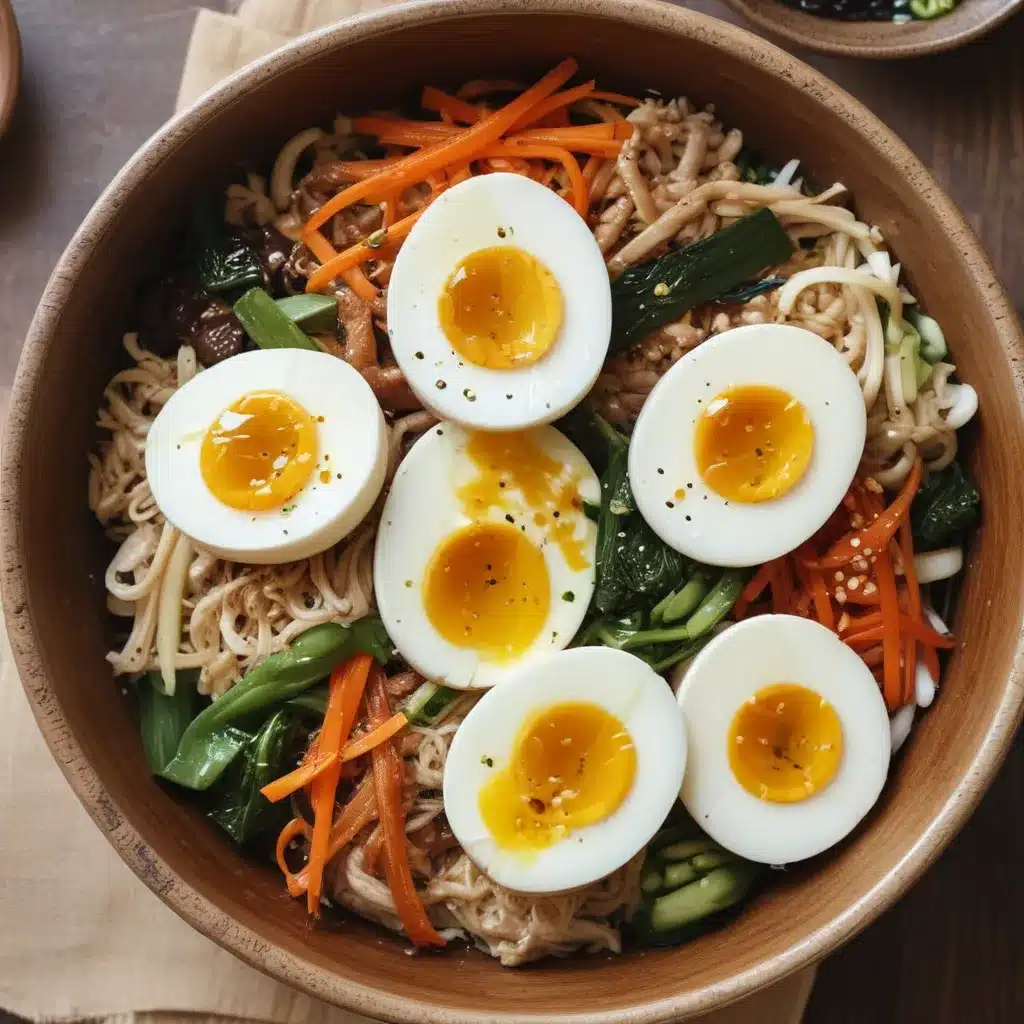
Unlocking the Secrets of Soy-Marinated Eggs
As a self-proclaimed foodie and avid home cook, I’ve always been fascinated by the rich culinary traditions of Korea. From the fiery kimchi to the savory bulgogi, Korean cuisine has a way of captivating the senses and leaving an indelible mark on your taste buds. But today, I want to dive into a particular Korean culinary delight that has become a staple in my kitchen – the humble, yet oh-so-flavorful soy-marinated egg.
You see, I discovered the magic of these soy-infused eggs serendipitously, while on a quest to create the perfect bibimbap – that iconic Korean dish of marinated vegetables, rice, and a perfectly cooked egg. I had heard whispers of this delectable egg preparation, but it wasn’t until I ventured into the bustling Korean markets of Boston that I truly understood its allure.
The Art of Soy-Marinated Eggs
As I wandered the vibrant aisles, my senses were immediately assaulted by the tantalizing aromas of soy, garlic, and toasted sesame. It was then that I stumbled upon a small, unassuming jar filled with deep, mahogany-colored eggs, swimming in a rich, soy-based marinade. Intrigued, I knew I had to bring these enigmatic eggs home and unravel their secrets.
Once back in my kitchen, I eagerly cracked open the jar, the pungent scent of soy and spices wafting through the air. I gently lifted one of the eggs, marveling at its glistening, amber-hued shell. With bated breath, I took a bite, and the explosion of flavors that followed was nothing short of revelatory.
The yolk, still perfectly runny, was imbued with the savory, umami-packed essence of the soy marinade, while the whites had taken on a delightful, silky texture. It was as if the very essence of the sea had been distilled into each bite, a harmonious dance of saltiness and richness that left me craving more.
The Many Faces of Soy-Marinated Eggs
As I delved deeper into the world of soy-marinated eggs, I discovered that they are not merely a one-trick pony. These versatile little gems can be enjoyed in a multitude of ways, each showcasing their unique flavor profile and textural qualities.
For instance, I love to serve them atop a steaming bowl of bibimbap, their golden yolks cascading down the vibrant array of vegetables and crispy rice. The salty-sweet marinade complements the earthy, umami-laden flavors of the dish, creating a symphony of tastes and textures that dance on the palate.
But the uses for these marvelous eggs don’t end there. I’ve also found them to be a delightful addition to simple salads, where their rich, savory notes can elevate a humble mix of greens and vegetables into something truly special. And let’s not forget their potential as a snack – I’ve been known to pop a soy-marinated egg or two as a quick, protein-packed pick-me-up, savoring the complex flavors with each satisfying bite.
The Science Behind the Soy-Marinated Egg
Now, I know what you’re thinking – how exactly does one transform a humble egg into this flavor-packed marvel? Well, my friends, the secret lies in the marinade.
The key to unlocking the full potential of the soy-marinated egg lies in the careful balance of ingredients and the marinating process. The soy sauce, which serves as the foundation of the marinade, not only imparts a deep, umami-rich flavor but also helps to tenderize the egg whites, resulting in that delectable, silky texture.
But the marinade doesn’t stop there. Garlic, ginger, and a touch of sugar are often added to the mix, creating a harmonious blend of savory, aromatic, and subtly sweet notes. And let’s not forget the importance of the marinating time – the longer the eggs soak in this flavorful elixir, the more pronounced and well-rounded the flavor becomes.
Crafting the Perfect Soy-Marinated Egg
Of course, as with any culinary endeavor, there’s an art to perfecting the soy-marinated egg. It’s all about finding the right balance of flavors, the ideal marinating time, and the perfect cooking technique.
I’ve experimented with countless variations, tweaking the marinade ratios, playing with different spices and aromatics, and exploring various cooking methods. And let me tell you, the results have been nothing short of revelatory.
One of my favorite iterations involves a marinade of soy sauce, rice vinegar, honey, garlic, and a touch of toasted sesame oil. I let the eggs soak in this fragrant blend for at least 24 hours, allowing the flavors to fully permeate the shells. When it comes time to cook, I gently lower the eggs into a simmering pot of water, letting them achieve that perfect, runny yolk that oozes with each bite.
Soy-Marinated Eggs: A Gateway to Korean Cuisine
As I’ve delved deeper into the world of soy-marinated eggs, I’ve come to realize that they are not just a delicious culinary delight, but a gateway to the rich and diverse world of Korean cuisine. These humble eggs serve as a microcosm of the intricate flavors, techniques, and traditions that define this vibrant food culture.
You see, the soy-marinated egg is not just a standalone dish, but a integral component of many beloved Korean staples, from the aforementioned bibimbap to the hearty kimchi stew. It’s a testament to the Koreans’ mastery of balancing flavors, their reverence for quality ingredients, and their unwavering commitment to creating dishes that nourish the soul as much as the body.
Conclusion: Embracing the Soy-Marinated Egg
So, my fellow food enthusiasts, I invite you to join me on a journey of culinary discovery, where the humble soy-marinated egg takes center stage. Whether you’re a seasoned Korean cuisine aficionado or a newcomer to these vibrant flavors, I can assure you that these eggs will captivate your senses and leave you craving more.
Believe me when I say that once you’ve experienced the magic of a perfectly crafted soy-marinated egg, your perception of what a simple egg can be will be forever transformed. So, what are you waiting for? Grab a jar, get marinating, and let the flavors of Korea transport you to a whole new world of culinary delights.
And if you’re looking to explore the rich tapestry of Korean cuisine even further, be sure to check out Korean Garden Boston, where you can indulge in a wide array of authentic Korean dishes, expertly prepared by our talented chefs. Trust me, your taste buds will thank you.
